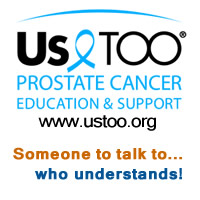|
||||||||
| Home | News You Can Use |
About Us TOO Florence |
Personal Journeys | Slideshows | Contact Us | |||
Events News you can use Treatments |
Us TOO FLORENCE - BEHIND THE HEADLINES-20 BY BOB HORNEY - PROSTATE CANCER SURVIVOR - Us TOO CHAPTER LEADER (Published June 10, 2015, The Siuslaw News) With Father's Day just around the corner, I want to use that occasion to encourage men to make sure they are taking advantage of screening for the second most frequent cause of cancer death among men - namely, prostate cancer. As so many of us know, the latest "word" on prostate cancer screening came from the U.S. Preventive Services Task Force (USPSTF) in 2012, and that word is: "The USPSTF now recommends against PSA-based screening for prostate cancer in all age groups." That was music to the ears of vast numbers of men ("See, I don't need that test") as evidenced by the fact that referrals to urologists are already down 25-35 percent. This doesn't mean fewer men are getting prostate cancer, it means fewer men are being screened by their primary care physicians. As a result of fewer men being screened or being screened less often, preliminary data for 2012 and 2013, suggests that more men are now being diagnosed with higher-risk prostate cancer (PSA of 10 or more). This increase reverses a trend leading up to 2011, when there had been a steady decline in the percentage of men diagnosed with a PSA of 10 or more. By scaring men that they will lose their ability to have sex and will dribble urine (forever) if they should undergo treatment, the USPSTF has convinced many men to follow its recommendation and forgo the PSA test entirely. Unfortunately, for that 1 man in 6 who will ultimately be diagnosed with prostate cancer (due mainly to symptoms if not being screened), the diagnosis will reflect a more advanced cancer with a much lower cure rate. One thing most of us come to grips with at diagnosis is that this is not "my" cancer, but "our" cancer. At the least, that includes a spouse/significant other, but we know it also involves the immediate and extended family. Everyone, in one way or another, shares the burden of this disease and hopes the burden will be as small as possible...just be a "bump" on the road of life, not the end of the road with no turn-around. In 2003, Alan Burns, then Florence Mayor, proclaimed September as Prostate Cancer Awareness Month in Florence and included two important statements: whereas, at any age prostate cancer devastates families, through loss of income, partnership and support, and whereas, prostate cancer leaves too many parents, women, children and other family members without a man they love. Those two statements have remained in the Proclamation with mayors Phil Brubaker and Nola Xavier for good reason; they are the heartbreaking consequences of an advanced or metastatic prostate cancer diagnosis. Unlike most cancers, we men have the screening tools to usually avoid that diagnosis of advanced disease. But, first we have to use them, as in getting ourselves to a doctor (I'd even suggest a urologist) for a baseline PSA test and digital rectal exam (DRE). The oft-spoken, "I feel fine," doesn't cut it with prostate cancer. Early, curable prostate cancer rarely has symptoms and by the time it becomes symptomatic, it is nearly always too late for curative treatment. Those are just the plain facts of this disease. For this Father's Day, I propose dads "turn the tables" and do something special for their kids - like making sure they have a baseline PSA and DRE in their records. And, in particular, any dad who is at least age 40 (or 35 if prostate cancer is in your family), should get that baseline PSA/DRE for their kids. Don't let a "screenable" disease like prostate cancer spoil future Father's Day Celebrations! Not a dad? The same advice applies - do it for someone else, even for yourself...just do it. If you need those screening tests, see your primary care physician or arrange to have them here in Florence with a urologist by calling Oregon Urology Institute at (541) 334-3350. |
| www.ustooflorence.org Copyright © 2010 - 2024 | |

